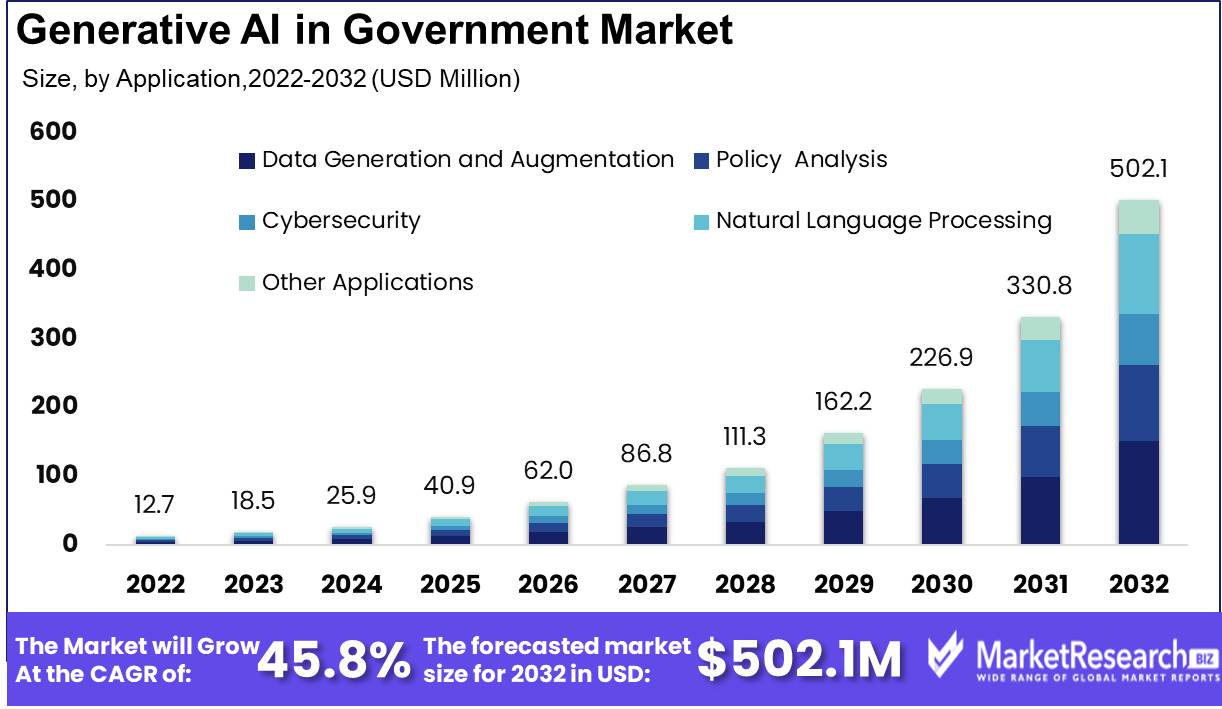Generative AI in Government Market Is Projected To Grow At A 45.8% Rate Through The Forecast Period

Page Contents
Market Overview
Published Via 11Press : Generative AI in Government Market size is expected to be worth around USD 502.1 Mn by 2032 from USD 12.7 Mn in 2022, growing at a CAGR of 45.8% during the forecast period from 2022 to 2032.
Generative Artificial Intelligence (AI) in government operations has received considerable interest. Generative AI systems create new content based on patterns or input data – this technology could transform various aspects of government operations such as policy making, citizen services and cybersecurity.
Generative AI can assist government agencies with policy-making by analyzing large volumes of data and extracting insights that support decision-making processes. AI algorithms can efficiently process all this information from multiple sources to identify trends, patterns, or correlations that human analysts might miss, leading to more informed and evidence-based policy choices.
Generative AI also holds great promise to enhance citizen services by improving interactions between governments and their constituents. Chatbots powered by this technology provide personalized responses to citizens' inquiries, and real-time support, and can even simulate human conversations – helping governments scale services, reduce response times and enhance overall satisfaction among constituents.
Generative AI can play an invaluable role in supporting governments' cybersecurity efforts. Governments face increasing cyber attacks from both cyber criminals and state-sponsored hackers; AI-powered systems can assist governments in detecting and preventing these attacks by monitoring network traffic, identifying anomalies, and developing predictive models to anticipate breaches – helping governments strengthen defenses more efficiently while mitigating risks more efficiently.
Adopting generative AI raises ethical and regulatory concerns for government sectors. Potential misuse of AI-generated content such as deepfake videos or falsified information poses risks to national security and public trust, necessitating robust frameworks and guidelines to ensure the responsible use of this technology.
Overall, generative AI provides numerous opportunities to government markets for improving policy-making, citizen services and cybersecurity. By harnessing AI's power, governments can increase efficiency, responsiveness and decision-making capabilities – however, it must be applied responsibly so as to maximize benefits while mitigating any potential risks.
Request Sample Copy of Generative AI in Government Market Report at: https://marketresearch.biz/report/generative-ai-government-market/request-sample

Key Takeaways
- Generational AI for government markets allows data-driven policy making by analyzing huge volumes of information to detect trends and patterns.
- Citizens services can be enhanced using generative AI, offering personalized responses and efficient support through chatbots and virtual assistants.
- Generative AI systems help governments detect and prevent cyber attacks by analyzing network traffic, recognizing anomalies, and creating predictive models.
- Responsible and accountable use of AI technology within government is crucial in order to minimize risks related to potential misuse of content generated by AI-generated systems.
- Government agencies can leverage generative AI to automate administrative tasks, increasing operational efficiencies and freeing up resources for more ambitious initiatives.
- Integrating generative AI into government workflows enables faster and more precise decision-making processes by processing and interpreting large amounts of data quickly and accurately.
- Generative AI can assist in the creation of realistic simulations and predictive models to aid disaster prevention, response and recovery efforts.
- Governments must put into place comprehensive ethical and regulatory frameworks that will facilitate fair and transparent use of generative AI technology in public service settings.
Regional Snapshot
North American countries, including the US government, are exploring how generative AI can assist them with policy-making, citizen services and cybersecurity. Federal agencies are using generative AI algorithms to analyze massive datasets and extract valuable insights, which in turn enables policymakers to make more informed decisions based on evidence and trends; chatbots powered by generative AI are being deployed for citizen services with personalized responses provided via chatbots or virtual assistants; while Canada also utilizes this form of technology for evidence-based decision-making and increasing citizen engagement.
Europe has witnessed significant advances in its adoption of generative AI by government sectors. Estonia is known for its groundbreaking digital governance; using AI technologies to automate administrative processes and enhance citizen services; in its e-residency program AI is used to streamline application processing and deliver efficient services for digital residents. Meanwhile the UK government has also adopted this innovative form of artificial intelligence; employing chatbot services that offer personalized responses and round-the-clock support for citizens utilizing their services.
Asia-Pacific region has made great strides in employing generative AI in government operations, with Singapore's Smart Nation initiative having taken the lead by adopting this form of technology to improve decision-making and citizen services using it. AI powered systems for policy analysis were also implemented as well as virtual assistants and chatbots powered by this AI that provide efficient support services to citizens. Australia has also invested heavily in similar solutions across several government sectors.
Middle East and Africa region governments are beginning to employ generative AI in government applications. The United Arab Emirates (UAE) has been at the forefront of adopting AI technologies across various sectors, including government. Recognizing its potential in driving efficiency and innovation, UAE government officials have recognized AI-powered chatbots and virtual assistants to streamline services to citizens as well as providing real-time support. Furthermore, generative AI is being applied towards smart city initiatives, cybersecurity measures, public safety enhancement, as well as to ensure seamless experiences for citizens.
For any inquiries, Speak to our expert at: https://marketresearch.biz/report/generative-ai-government-market/#inquiry
Drivers
Enhance Efficiency and Automate
Generative AI can automate repetitive tasks and streamline processes within government agencies, freeing employees up to focus on more complex initiatives. Generative AI is often utilized for report generation, data analysis, or citizen service provision to maximize overall efficiency.
Improved Decision-Making
Generative AI technology in government agencies can greatly enhance their decision-making processes. AI algorithms can quickly analyze large volumes of data to detect patterns and generate insights that support evidence-based decision-making processes, which enables government agencies to make more informed policy choices, identify risks more quickly, and develop targeted interventions to meet societal challenges more efficiently.
Strengthened Security and Public Safety Enhanced
Generative AI holds great promise for improving security and public safety measures. AI algorithms can analyze surveillance footage to detect anomalies and predict threats; additionally, advanced cybersecurity measures using this form of artificial intelligence could protect sensitive government data by analyzing network traffic patterns to detect vulnerabilities that exist and safeguarding against their exploitation.
Improved Citizen Services
Generative AI presents opportunities for improving citizen services provided by governments. Chatbots powered by this AI can offer round-the-clock assistance to citizens, answering their inquiries and offering personalized recommendations. Similarly, automation and improving processes related to application submission, feedback analysis and personalized service delivery resulting in better citizen experiences overall.
Restraints
Ethical and Legal Considerations in Software Testing
Government use of generative AI raises ethical and legal considerations that warrant close scrutiny, including questions of ownership and privacy regarding generated content. As governments adopt regulations and guidelines to govern ethical use of generative AI to avoid bias or discriminatory outcomes.
Trust and Adoption Challenges
Adopting generative AI into government processes may meet with resistance and skepticism from citizens and government employees alike, due to concerns over job displacement or reliability issues with AI-generated content. Building trust in this technology while also addressing any bias or errors is paramount to meeting these challenges successfully.
Data Privacy and Security
Generative AI relies on large amounts of data for training and producing content, which presents government agencies with an important challenge when it comes to protecting the privacy and security of sensitive government information. They must implement stringent data protection measures, comply with privacy regulations, and establish safeguards against data breaches or misuse.
Skills and Infrastructure Requirements
Integrating generative AI solutions into government processes requires trained personnel and adequate infrastructure. Designing and maintaining AI systems require expertise in data science, machine learning and AI engineering – therefore governments should invest in training programs and infrastructure upgrades to ensure successful implementation.
Opportunities
Policy Development and Analysis
Generative AI offers governments an opportunity to enhance policy creation and evaluation. AI algorithms can assist governments in evaluating existing policies, identifying gaps, and producing insights to support evidence-based policymaking. By harnessing generative AI's power to analyze policy environments more thoroughly and provide more responsive policies that address complex societal issues more effectively.
Predictive Analytics and Resource Allocation
Generative AI provides predictive analytics services to governments, allowing them to anticipate future trends and allocate resources effectively. By analyzing historical data, generative AI algorithms generate predictive models which assist governments in optimizing resource allocation, planning infrastructure development projects and providing superior public services.
Citizens Engage and Participate
Generative AI can enhance citizen participation in government decision-making processes. AI platforms can generate interactive content such as surveys or simulations that enable citizens to provide their input on policy discussions while at the same time contributing directly to policy discussions themselves. This promotes transparency, inclusivity and empowers them actively participate in shaping government initiatives.
Public Health and Emergency Response systems
Generative AI can play an invaluable role in public health and emergency response systems. By analyzing vast amounts of health-related data, generative AI can aid in the prediction of disease outbreaks, optimizing healthcare resource allocation decisions, and creating efficient emergency response plans – ultimately helping governments respond more quickly in situations of public health crises or natural disasters.
Take a look at the PDF sample of this report: https://marketresearch.biz/report/generative-ai-government-market/request-sample
Challenges
Bias and Fairness
Generative AI systems may unintentionally inherit biases present in their training data, leading to biased outputs. Addressing bias and ensuring fairness in AI-generated content remains a top challenge for governments, so efforts must be taken to train AI models on diverse and representative datasets while employing techniques that mitigate biases while fostering fairness.
Regulatory Frameworks
The rapid advance of generative AI poses considerable regulatory challenges to governments. Governments must keep up with ever-evolving technologies and create guidelines to promote responsible and ethical use of generative AI, including regulations surrounding content generated by it, data privacy concerns and accountability considerations that need careful thought.
Explainability and Transparency
Generative AI algorithms can often seem opaque to their creators, making their decision-making processes difficult to interpret and comprehend. Governments should prioritize research into explainable AI techniques to ensure transparency and accountability within any AI content that influences key government decisions.
Human-AI Collaboration
Governments need to find an equilibrium between human engagement and AI automation. Integrating generative AI into government processes should prioritize collaboration between AI systems and human experts; this requires clearly outlining roles and responsibilities, setting up feedback loops and creating an environment which values both types of capabilities equally.
Market Segmentation
Based on Application
- Data Generation and Augmentation
- Policy Analysis
- Cybersecurity
- Natural Language Processing
- Other Applications
Based on the Deployment Mode
- On-Premises
- Cloud-Based
Based On End User
- Government Agencies
- Government Officials
- Public Service Providers
- Government Customer Service
- Other End Users
Key Players
- Open AI
- IBM Watson
- Microsoft
- Google Cloud AI
- Nvidia
- Other Market Players
Report Scope
| Report Attribute | Details |
| Market size value in 2022 | USD 12.7 Mn |
| Revenue Forecast by 2032 | USD 502.1 Mn |
| Growth Rate | CAGR Of 45.8% |
| Regions Covered | North America, Europe, Asia Pacific, Latin America, and Middle East & Africa, and Rest of the World |
| Historical Years | 2017-2022 |
| Base Year | 2022 |
| Estimated Year | 2023 |
| Short-Term Projection Year | 2028 |
| Long-Term Projected Year | 2032 |
Request Customization Of The Report: https://marketresearch.biz/report/generative-ai-government-market/#request-for-customization
Recent Developments
- In 2022, the US Department of Defense made public its intentions to employ generative AI for fraud detection models within its financial systems.
- In 2023, the US Department of Veterans Affairs announced it would utilize artificial intelligence-powered robotic process automation software to automatically generate discharge summaries for veterans.
- In 2022, the European Commission made an announcement that it would employ generative AI for translating documents across all 24 official European Union languages.
- In 2023, the US Department of State announced its intent to utilize generative AI for developing a virtual agent capable of answering inquiries regarding passports and visas.
FAQ
1. What is Generative AI in the Government Market?
A. Generative AI refers to the application of artificial intelligence algorithms to generate new content or data. When employed within government environments, this technology can automate tasks, enhance decision-making processes, and enhance citizen services.
2. What benefits will generative AI brings to the government sector?
A. Generative AI offers many advantages to the government in various ways. It can automate repetitive tasks for greater efficiency and resource savings; support evidence-based decision-making by analyzing large datasets for insights; as well as enhance citizen services with personalized recommendations and 24/7 chatbot assistance.
3. What are some potential applications of Generative AI within government institutions?
A. Generational AI can be applied in numerous government domains. It can assist with policy development and analysis, predictive analytics for resource allocation, citizen engagement platforms, public health emergency response systems, cybersecurity measures, and much more.
4. What are the challenges associated with Generative Artificial Intelligence for government markets?
A. Considerations should include ethical concerns related to data ownership and privacy; trust issues among citizens and government employees; data privacy and security risks; bias in AI-generated content, as well as ensuring adequate personnel and infrastructure resources are in place for successful implementation.
5. How can governments address ethical concerns related to generative AI?
A. Governments can address ethical concerns by creating regulations and guidelines to promote transparency, accountability and the ethical use of generative AI. Priorities should include fairness and nondiscrimination while devising methods of counteracting biases found within AI-generated content.
6. What steps can governments take to establish trust in generative AI?
A. Governments looking to promote trust in generative AI should prioritize transparency and explainability when designing AI systems, making sure decisions can be seen through, their output explained, and conducting audits or including human experts in decision-making processes. Conducting audits or inviting external experts can also increase trust levels.
7. How can governments facilitate collaboration between generative AI systems and human experts?
A. Fostering collaboration requires clearly outlining roles and responsibilities for both generative AI systems and human experts. Governments can encourage feedback loops, establish channels for continuous communication, and establish an environment that recognizes human expertise alongside AI capabilities – this ensures that generative AI augments rather than replaces human skills and knowledge.
Contact us
Contact Person: Mr. Lawrence John
Marketresearch.Biz
Tel: +1 (347) 796-4335
Send Email: [email protected]
Content has been published via 11press. for more details please contact at [email protected]
The team behind market.us, marketresearch.biz, market.biz and more. Our purpose is to keep our customers ahead of the game with regard to the markets. They may fluctuate up or down, but we will help you to stay ahead of the curve in these market fluctuations. Our consistent growth and ability to deliver in-depth analyses and market insight has engaged genuine market players. They have faith in us to offer the data and information they require to make balanced and decisive marketing decisions.



